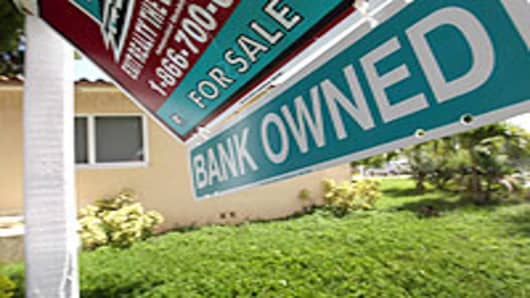Amid a new flare-up in the national foreclosure crisis, a closely-watched private-sector index Thursday showed foreclosure activity in September rose on both a monthly and annual basis for the first time in four months.
The report, released by foreclosure listing website RealtyTrac, also found that banks took ownership from homeowners at a record pace in September.
The discouraging data comes as attorneys general in all 50 states Wednesday agreed to join forces in an investigation into whether banks and other lenders have used false signatures and documents to justify foreclosures.
Meanwhile, major mortgage lenders such as Bank of America , GMAC, JP Morgan and PNC Bank have voluntarily halted foreclosure activity in some states, if not all 50, as they review their foreclosure process. Lenders made a similar move in 2009.
The RealtyTrac report found that foreclosures were up 2.53 percent in September from the previous month, and up 1.10 percent from the previous year. In all, 347,420 properties were in the foreclosure process. It was the first annual increase since May.
One in 371 U.S. households received a foreclosure notice in September. (Foreclosure notices are defined as a default notice, auction sale notice or bank repossession.)
Bank repossessions, the final step in the foreclosure process after a home fails to sell at auction, reached a record high of 102,134. It was the first time that bank repossessions have surpassed the 100,000 mark since RealtyTrac began collecting data in 2005.
The latest foreclosure moratoriums are not reflected in the data yet, said Rick Sharga, senior vice president of RealtyTrac.
“They happened too late to have a material effect on September numbers,” he said. RealtyTrac expects to see a dip in bank repossessions in the coming months, and possibly in the early stages of the foreclosure process as well, and then a rise again as the halt is ended.
"These loans will not escape foreclosure," said Sharga. "We’re just delaying the inevitable."
Sharga said that a prolonged halt on foreclosures could affect the entire housing market and home prices. Foreclosures make up 30 percent of home sales, and taking those sales out of the equation “could knock the stilts out of the housing market,” he said.
John McGeough, a co-broker and owner of McGeough Lamacchia Realty said that the current foreclosure freeze may give distressed homeowners extra time to do a short sale and avoid having their homes repossessed by the banks. "Foreclosure should be the last resort," he said.
The ten states with the highest foreclosure rates were little changed from the previous month. Nevada had the highest foreclosure rate in the country with one in every 69 properties in the state getting a foreclosure notice. (Nevada also has the highest unemployment in the country.)
Florida ranked second with one in every 148 households receiving a notice, followed by Arizona (one in 159 households), California (one in 178 households) and Idaho (one in every 204 households.) (See the full list in our slideshow.)
Vermont had the lowest rate, with one in every 10,780 properties receiving a foreclosure notice.


